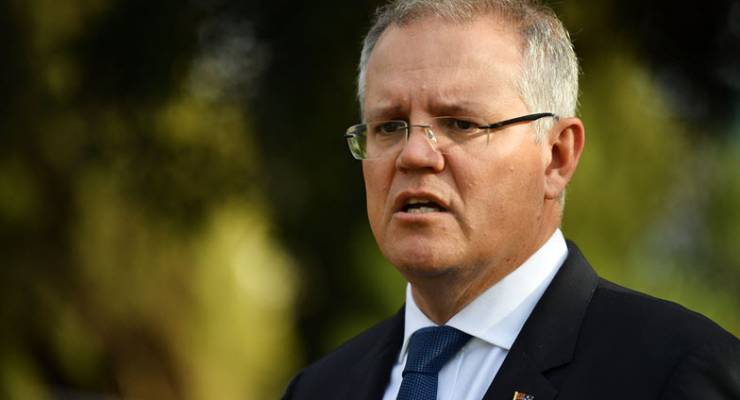
Whatever passes for the brains trust within the government at the moment needs, in between waiting for the next Tony Abbott attack, to work out a smarter response to Bill Shorten’s war on inequality than what’s been on offer so far. And quickly.
So far, the lines from the government have been a clumsy amalgam of claims that Shorten is engaged in class war, lifting the overall tax burden and failing to be sufficiently worshipful of small business. They’d all go down well with the elderly, wealthy Liberal Party base. You can almost see pearls being clutched and sherry sloshing around glasses in agitation.
On planet Earth, however, those lines do little to help the government, and they might even help Shorten.
Accusing Labor of class warfare — which is also a favoured tactic of News Corp — assumes the electorate would be mortified at the idea of going after the rich. Problematically, a large chunk of the electorate is only too happy to see someone going after the rich. Some of them, currently, don’t support Labor. Worse, it hypes what Labor is actually doing into something it is not. Labor’s proposals for imposing a 30% tax rate on disbursements from trusts to adults excludes farmers, who are some of the biggest rorters of trusts. It will only raise around $1 billion a year — Labor had to stretch the revenue gains over ten years to make them sound impressive. It is, to use the words of one tax expert, “surgical” in its impacts on high income.
[Keane: we’re missing the point on inequality]
Calling this class war and “dripping with envy” does Labor’s sales job for it, telling the electorate it will have a far bigger impact in terms of improving the equity of the tax system that it actually will. And it’s more than a little confusing to hear this government complaining about Labor lifting the overall tax burden. One billion dollars a year is currently around a fifth of one per cent of tax receipts. The government is planning to lift the tax annual take by $88 billion over the next four years, to 23.7% of GDP — fully 2.3 percentage points of GDP higher than the level it inherited from Labor. Who’s lifting the overall tax burden?
Voters, however, don’t think in such terms anyway — they think about how much tax they’re paying, not the numbers at the back of Budget Paper No. 1, and very few taxpayers will even have a detailed understanding of what a discretionary trust does, let alone have one.
The government’s response both on the trusts proposal and more broadly to Shorten’s emphasis on inequality is rooted in a Howard-era belief that all Australians are budding rugged individualists who dream of establishing their own business, owning a McMansion and sending their kids to private school. It was always a fantasy, but it’s a much more lurid one now after wages have stagnated for years and voters have become steadily less happy with corporations and high-income earners getting away, it seems, with paying less tax than they should.
[Razer: inequality IS the point]
The government, and its media cheerleaders, can insist that the tax system is highly progressive and that high-income earners pay a grossly disproportionate amount of the overall tax take, but the likely response from voters at the moment is “so they bloody should”.
Shorten’s focus on the tax system is risky, but clever. It can stir up angry, well-resourced constituencies who can mount strong campaigns against Labor. Don’t discount the possibility that a smart campaign by small business will damage the opposition. But it also give a clear, sharp focus to potentially nebulous commitments to address inequality. Labor’s imagery of a two-tier, economy-and-business class tax system captures exactly the disgruntlement of many voters — doubtless reflecting the substantial investment in focus group research it reflects.
Collecting an extra billion from trusts will do little to change the reality that our tax system still provides extensive opportunities for high income earners to reduce their tax obligations, even if they’re fewer than a couple of years ago. But it will give voters the sense that inequality is being addressed. The government should find a way to stop acting as PR agents for Labor on that score.








“ATO signals crackdown on work uniform tax claims”. Yep, if that’s not class warfare, what is?
When all they have is the trickle down theory, the gov’t can’t win.
Tax as a tumbril – what’s not to love? “Let them eat brioche!” “Aux armes, citoyens…!”
or breakfast Ortolan
In short, discretionary trusts don’t distribute a fixed entitlement to benificiaries (the way a conventional estate would through wills and such) – the trustee decides which of the benificiaries get what, and when they get it.
The benificiaries have a right to be “considered” (whatever that means) when (or if) distributions are made.
So a business operated through a discretionary trust; can decide which suppliers get paid, when, and how much.
And forget suing the trust, because it’s a different entity.
Even if they don’t get much tax out of it, at least this old todge will become less attractive.
Income is only part of the story.
M Turnbull is not wealthy just because he earns $500K+ salary as PM. The annual return on his $200m personal fortune would dwarf that amount.
Turnbull could easily afford to spend $1m or more per year on (tax deductible) portfolio and tax advice – which ensures better returns on investments and tax payable than available to ‘ordinary Australians’.
That’s the real nature of inequality – in a time of low growth and high asset inflation, wealth is begetting more wealth and none of it is being taxed.